


Home Energy Water Work Economy Solution Politics Team Product Recycling Cars Ships Aircrafts Promotion
World Pollution Air Weather Violence Women Weapons Psychology Plants Animals Food Peace Faith Imprint
Home
Big problems are coming our way!
Current situation:
2024 was the warmest year since weather records began, with the global average temperature exceeding pre-industrial levels by 1.6 degrees Celsius for the first time. We are now on the fastest track to an increase of 3.0 degrees Celsius, which we could reach as early as 2033, or at the latest by 2050.
Latest report: The projected warming of the Earth's surface is currently at +1.5 °C in 2025.
The German Federal Environment Agency states:
“Depending on the scenario, the average warming by 2100 could range from 1.5 to 5.7 °C compared to pre-industrial conditions (reference period: 1850-1900). Only under the condition of extremely ambitious climate protection measures and a drastic reduction in CO2 and other greenhouse gas emissions could the average temperature increase by 2100 compared to pre-industrial times be limited to 1.5 to 2.4 °C.” I consider these latter figures unrealistic.
Because: If the temperature were to rise as it is currently doing, we should reach at least +5.7 °C by the year 2100. Based on the current exponential increase, we would actually reach +3.0 °C by 2050 at the latest. It could happen even earlier. In light of the latest efforts by a "country alliance" of major oil and gas states, which blocked a clear phase-out of fossil fuels at COP 30, I consider the former scenario (~ + 5.7 °C) to be plausible and realistic.
Therefore, I updated the graphic below with the new data using artificial intelligence. The currently much faster rising temperatures are presumably related to the current wars and the associated launches of shells and increased missile fire. The increased number of rocket launches to launch satellites into space could also be a reason, as all of these activities have a very direct impact on the Earth's surface and are not initially compensated for by the oceans, like the solar radiation trapped in the atmosphere.
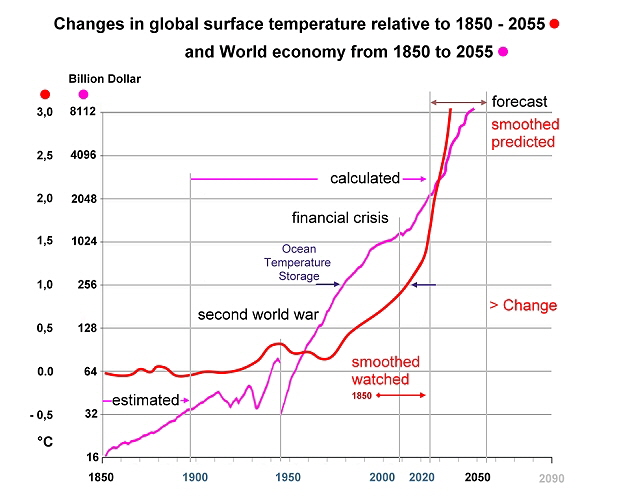
The summary graph
of gross national income and average temperature increase clearly shows how our mass production, the transport of goods across the world's oceans by ships powered by crude oil, and our other fossil-fuel-based activities such as air and road traffic affect the temperature. In this summary graph, we can see that economic development (purple line) and the current temperature (red line) mostly develop in parallel. Thus, we see, on the one hand, the precise connection between economic growth and global warming, which is primarily due to the senseless mass production of low-quality and short-lived products, but also, on the other hand, the compensating effect of the world's oceans. The graph also clearly shows how devastatingly direct wars are reflected in the Earth's surface temperature.
World War II had the first significant and direct impact on Earth's temperature; afterward, temperatures initially fell again, even though production had already returned to wartime levels by 1955. Many scientists suspect this is the effect of aerosols in the stratosphere due to the production and emissions of various volcanic eruptions. Well, volcanic eruptions tend to be noticeable locally and for a very short time; only when the aerosols reach the stratosphere can they block the sun's rays. It is therefore conceivable that the aerosols originated from the firing of shells, warship and tank activity, and the bombing of cities. They then reached the stratosphere shortly after the war, spread widely, and thus caused a slight cooling from 1960 to 1970, in conjunction with the compensating effect of the oceans. But by 1970, all the aerosols had returned to Earth; after that, temperatures initially rose very sharply, and then in a long arc almost parallel to economic activity. From 2023 onwards, temperatures suddenly begin to rise faster than economic activity, and this is truly worrying because, at the same time, parts of the oceans suddenly no longer absorb CO2 but start release it, and heavy rain, hail, floods, fires, and suddenly even earthquakes increase exponentially.
The actual overall development of aerosols in the stratosphere also makes it clear that an extremely large amount of aerosols was needed to achieve a cooling of 0.1°C, and these had completely disappeared after just ten years. Now imagine how many aerosols would be needed to reduce the temperature by 2°C or even 3°C over a period of a thousand years. After just ten years, all the aerosols would land on land and in the oceans and would therefore have to be constantly renewed. Anyone pinning their hopes on geoengineering should therefore take this into account.
Water temperature is generally much lower than air temperature; we know this from swimming pools; this is how the oceans were able to absorb the air temperature well and thus reduce it. But little by little, the oceans charged up and now, with the highest bidder, have a temperature of over 30°C. The Mediterranean Sea in particular is very warm, and the temperature is stored there for a very long time, including through the winter. Now the oceans can no longer compensate for the global warming as well. The end of the compensation period was actually not supposed to be reached until 2055, apparently the end will be reached much sooner.
How was this graph created?
This double graph shows, on the one hand, known values from the data of the 2023 IPCC report on the observed changes in global surface temperature from 1850 to 2023. The estimate at the end of 2023 to 2050 was made using the available values of the planned gross national income. For illustration purposes, we always see a smoothed moving average here. The second line shows gross national income; this representation, as well as the original estimate, comes from industrial data we took from Statista. The more recent estimate was made due to the upcoming changes in profits, resource consumption, and the impending local warming caused by wars. Regarding the plans for artificial intelligence, which incidentally played a major role in calculating the data, it is very certain that both the previously planned profits and the surface temperature due to mineral extraction and processing, and the construction and operation of new data centers, will increase more than planned for 2023.
Floods of the century, forest and wildfires
A new tipping point is been reached
Once called "floods of the century," these floods—heavy rain events with flash floods that destroy entire villages, hailstorms with hailstones the size of oranges, large fires in forests and open spaces, even urban fires—are new and worrying phenomena that are unfortunately increasing exponentially, just like global heating.
Since 2018, we have seen a significant increase in events around the world. The number of events says nothing about their severity, which is also constantly increasing.
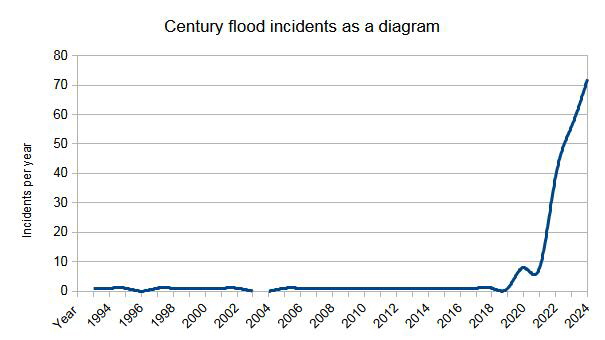
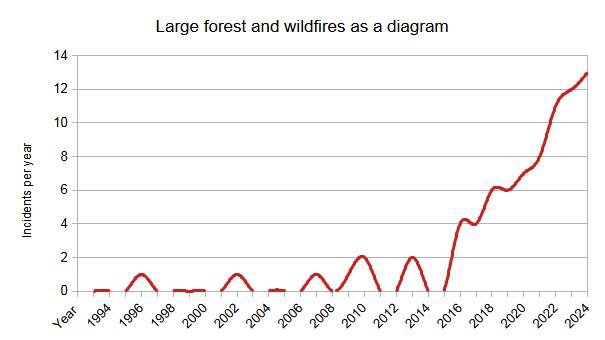
However, why are so many events occurring so suddenly?
Until now, the world's oceans absorbed both CO2 and temperature, which compensated for the reactions. It actually seemed to us as if global heating was only a slight warming. This we simply called climate change, which did not seem particularly dangerous. Now, the oceans are charged, and the temperature trapped beneath the CO2 effects much more directly in the atmosphere, while at the same time, millions of tons of warm surface water are evaporating. As a result, there are regional droughts with fires, especially in areas that were already hotter than others were, and, on the other hand, these sudden heavy rainfall events with terrible spring tides.
Unfortunately, we have to accept that these disasters are, on the one hand, becoming more frequent and faster, and, on the other hand, becoming more severe and affecting ever larger and wider areas. These events will not abate in the future, but will continue for at least a thousand years, because that is how long the CO2 will remain in the atmosphere.
The scientific initiative World Weather Attribution (WWA) identified a total of 157 severe extreme weather events worldwide in 2025.
Events were recorded if they resulted in over 100 deaths, affected more than one million people, or triggered a disaster.
Statistical breakdown of the 157 events:
• Floods: 49 cases
• Heat waves: 49 cases (considered the deadliest events)
• Storms: 38 cases
• Wildfires: 11 cases
• Droughts: 7 cases
• Cold waves: 3 cases
Key findings from the 2025 Annual Report:
• Impact of climate change: A detailed analysis of 22 of these events revealed that human-induced climate change measurably increased the intensity or probability of the event in 17 cases.
• Heat-related deaths: Heat waves claimed the most lives. In Europe alone, an estimated 24,400 heat-related deaths were recorded in the summer of 2025.
• Heat records: 2025 is considered one of the three hottest years since records began. For the first time, the three-year average temperature exceeded the 1.5-degree threshold set in the Paris Agreement.
• Economic damage: Extreme weather events in the EU caused costs of around €126 billion in the summer of 2025. In Germany, however, the damage figures for insurers were sometimes lower compared to previous years, which was described as a matter of luck.
Further information on the analyses can be found directly at World Weather Attribution.
https://www.worldweatherattribution.org/
I am pleased that another census was conducted with defined thresholds. This is important for accurately representing trends. I was working with more complex patterns that also included the size of the affected area and population density. It might be necessary to agree on certain thresholds to create valid statistics, ideally with a graph starting from 1900. The main problem here is likely the lack of comparable information in the available datasets. However, this would be necessary to adequately examine the entire spectrum of increased activity since our intervention.
Earthquakes
In 2024, again more earthquakes were recorded than in the previous year, almost three times as many. Mexico recorded the most earthquakes with a magnitude above 4.0 worldwide, followed by Indonesia. An unusually high number of earthquakes were also recorded in Central Europe. According to a study by the Helmholtz Centre for Geosciences and the University of Southern California, researchers attribute this exponential increase to the progressive rise in sea level caused by global warming, as well as the increasing intensity of extreme weather events such as storms. Both of these factors increase the mechanical pressure in the structure of tectonic plates and lead to changes in seismic cycles – with an increasing risk of earthquakes, particularly in coastal regions around the world.
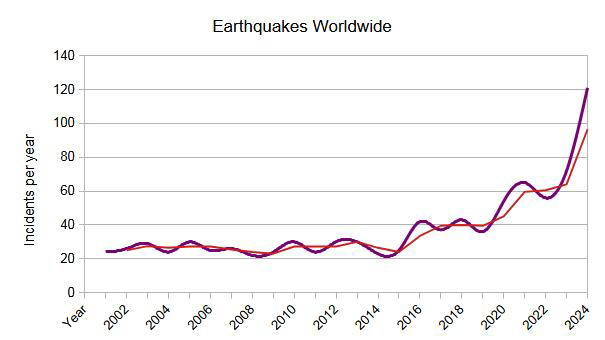
According to the 2023 IPCC report, sea levels will rise by an average of between 0.43 and 0.84 meters by 2100. However, the latest calculations predict a rise of 4 to 9 meters if we exceed the +3°C mark, and unfortunately, we are currently on the way there. If all land ice melts, experts predict a long-term rise of about 70 meters. Whether and when this extreme scenario will occur depends largely on compliance with climate targets and thus on continued greenhouse gas emissions. One thing is certain: even with strict reductions, the effects described above will continue for centuries.
SMOC and AMOC
Have a new tipping point been reached here too?
The simultaneous weakening of SMOC (Southern Meridional Overturning Circulation) in the south and AMOC (Atlantic Meridional Overturning Circulation) in the north indicates that the so-called thermohaline pump – the global circulation system that distributes heat and carbon across the world's oceans – could be stalling.
Analyses of satellite data show increasing salinization in the Southern Ocean – contrary to the expectations of climate models. Researchers suspect a fundamental change in the deep circulation.
An international research team led by the UK's National Oceanography Centre (NOC) has used high-resolution satellite data to determine that instead of transporting cold surface water to the depths, as has been the case so far; warm, CO2-rich deep water appears to be increasingly rising in the Southern Ocean. The data dates back to 2016 and systematically analyzed as part of the ESA SO-FRESH project.
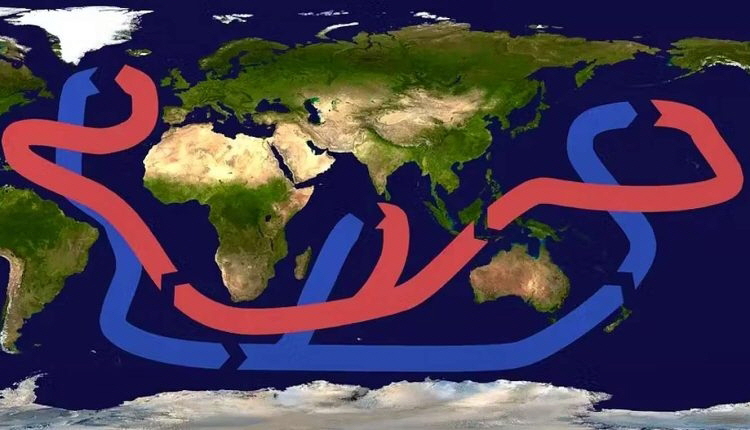
What is the SMOC and why is it so important?
The SMOC is a massive current system that causes cold surface water to sink, transporting heat, nutrients, and carbon dioxide—and acting as a climate cooler. Vertical mixing causes heat and carbon to be stored long-term in the depths of the ocean. Without this storage effect, the atmosphere would be noticeably warmer today.
Now new data shows the opposite: salinity and temperature in the Southern Ocean are rising—an indication that the previously stable stratification of the water becoming unbalanced. As a result, deep water, which has stored CO2 for centuries, is rising—and releasing this greenhouse gas back into the atmosphere. This could further increase the concentration of CO2 in the air—and thus further fuel climate change.
The consequences are potentially dramatic: melting processes in the Antarctic sea ice are accelerating; CO2 will being release and the stability of other current systems like the AMOC could be undermined.
Study results at a glance (Silvano et al., PNAS, June 30, 2025):
- Salinity increase since 2015 in almost all areas of the Southern Ocean
- Decrease in vertical stability, i.e., weaker stratification
- Reappearance of the Maud Rise Polynya – a sign of upwelling activity
- Persistently low sea ice cover since 2016
- Strong correlation between salinity and ice extent (r = -0.62)
Tipping point is reached? Connection to Rockström's warning
Swedish climate researcher Johan Rockström has been warning for years about the impending loss of the world’s oceans as a central CO2 sink. Current observations in the Southern Ocean could now mark precisely this critical point. The upwelling of deep water not only releases centuries-old carbon – it also significantly weakens the ocean's ability to absorb new CO2 from the atmosphere.
What does this mean for the world?
If the observed changes in the SMOC confirmed and sustained, several climate-relevant consequences could arise:
- An increased release of CO₂ from the ocean – with a simultaneous reduction in its absorption capacity
- An acceleration of Antarctic ice loss, particularly due to changes in heat inputs from the depths
- A possible impairment of the stability of the AMOC, if both systems more closely coupled than previously assumed
- In the long term, the Earth's climatic equilibrium could shift further
Overall, such a process would shorten the period in which the international community can still control global temperature rise through climate policy measures.
Whether the system will stabilize in the future – or tip into a new state – is currently unclear. However, given the real development with further increasing consumption of fossil fuels, stabilization is more than unlikely. The new findings on the state of ocean circulation reinforce the voices of those who believe that the climate crisis is approaching or has already passed its tipping point.
Source: PNAS Journal
COP 30
Once again, no real roadmap for phasing out fossil fuels
Once again, no agreement and continued obstruction by the Arab states, even though they possess the best opportunities for solar thermal energy production.
Disputes over a few tenths of a degree just to maintain the 1.5-degree target.
The statement, "The average temperature increase from January to August 2025 was 1.42 °C," is likely misleading. We calculated 1.49875 °C, which is essentially 1.5 °C above pre-industrial levels. January was the warmest January ever recorded (+1.8 °C). May saw an increase of 1.4 °C, breaking a streak of 21 consecutive months in which the global average temperature was more than 1.5 °C above pre-industrial levels, while August was the third warmest August ever recorded (+1.29 °C). June 2025 in Western Europe was 2.81 °C warmer than the average for June 1991-2020. The average temperature by October is 1.491 °C. Various sources indicate that 2025 is expected to end with global warming of approximately 1.48 °C to 1.52 °C above pre-industrial levels, depending primarily on the last two months. In any case, the +1.5 °C target is now history. These greenhouse gas-induced temperatures, despite fluctuations, are not decreasing significantly but rather increasing, because we continue to emit 37.8 to 39.6 billion tons of CO2 and other greenhouse gases per year, and these will remain in the atmosphere for up to a thousand years.
The manipulation of temperature forecasts down to tenths isn't the only thing that's completely wrong here. In 2000, the hope was to limit the temperature significantly below +2.0 °C by 2100. In 2015, the expectation was to reach +3.0 °C by 2100, and now it's assumed that +3.0 °C won't be reached until 2050 at the earliest. This means all the projections were too low, all the targets have been missed. "Alternative" figures are constantly being used; for example, I recently heard about a limit of +2.2 °C by 2100 and realized that this statement should include the unspoken caveat: "...with very ambitious countermeasures..." Another popular tactic is to cite specific reference periods, such as "Since 1990." These kinds of tricks are constantly employed by broadcasters and government agencies alike, resulting in the average citizen being unable, and probably intentionally prevented, from finding any real basis for their claims. The situation is far worse than previously thought, and temperatures could rise much faster than anticipated.
The same applies to sea level. Sometimes it's predicted to rise by 6-7 meters by 2100, then certain scientists come along with only 4 meters because this would suggest a warming similar to that of ten thousand years ago. Well, we know exactly how much ice is present in the Arctic and Antarctic. We also know how quickly the glaciers in the mountainous regions are melting and how much water is stored there. And we see that practically nothing is being done in terms of drastic or ambitious countermeasures. So we can expect at least +3.0 °C by 2050 and +5 °C by 2100, as well as a sea level rise of 19 to 22 meters by 2100. It could also happen significantly faster and be much more severe.
Yes, it's probably exactly like that, and it becomes even more likely with each new COP (Cognitive Performance of the World) report. There are more and more forests that produce greenhouse gases instead of oxygen. The thawing of permafrost in the affected zones could release billions of tons of greenhouse gases into the atmosphere through the decomposing plant material stored there. The oceans could also suddenly produce billions of tons of greenhouse gases, leading to an exponential rise in Earth's surface temperature that would melt almost all the ice in the Arctic, Antarctic, and the mountains by 2100. Promising and actually paying money to the countries affected by global warming is pointless; it won't solve the problem, and the temperature will continue to rise.
It is highly unlikely that humanity will reach an agreement and find and implement a solution to prevent such a scenario. It is even less likely that any miracle technology, such as dumping billions of tons of silicate or limestone into the oceans to lower the pH level so that the seas could absorb even more CO2, will be implemented. Or consider building CO2 capture plants the size of Tokyo and then pumping the energy-intensive CO2 captured beneath the seabed. With the mineral-based approach, there's a risk of re-saturation with CO2, and the oceans would quickly become acidic again.
These are all fantasies that would require practically impossible industries, which would then also have to be powered by emission-free energy. Who would pay for such a thing? Perhaps the very CO2 producers who generate the profits from their mass production? The same applies to wind turbines and photovoltaic systems. The creation and disposal of these technologies generate significant amounts of greenhouse gases. The available land on Earth is simply insufficient to produce the energy we need. There aren't enough rare earth elements and critical metals to equip every country with such technologies, and the resulting waste would be irrational, as the lifespan of such systems is far too short at 25-30 years. Recycling is still inadequate, in many cases impossible, or prohibitively expensive. Many critical metals still end up in hazardous waste landfills.
So why not switch immediately to a system of emission-free energy production? With a 24/7 365 supply without gigantic amounts of battery storage, with lifespans of around one hundred years, simple recycling, and minimal need for rare earths and critical metals. With the help of artificial intelligence, we could easily determine the cost-benefit ratio for any planned scenario at any time.
The last GCP Report
A new record value for CO2 emissions will also be set in 2024
The Global Carbon Project (GCP) published its annual carbon dioxide emissions and atmospheric CO2 levels for 2024 in December.
Accordingly, CO2 emissions have increased again by 0,8 percent compared to 2023.
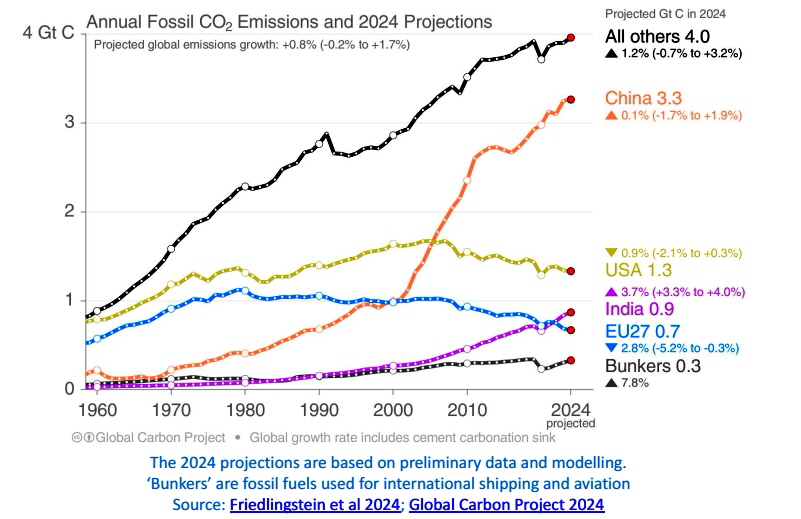
Increasing emissions are measured in China and India, while they decreased only very slightly in the US and the EU.All other countries also saw a further increase of 1.2%. Conclusion: Global CO2 emissions from fossil fuels such as oil, coal, and natural gas continue to rise exponentially.
At the same time, further deforestation contributed to land vegetation absorbing less CO2 this year.
Fires and wars also contributed to rising emissions.
At the same time, the oceans are absorbing less and less CO2.
Overall, global emissions are still increasing exponentially. The measures decided at the climate conference are not sufficient for the necessary climate protection. Even tripling the number of nuclear power plants, which would only be completed in ten years, cannot stop this trend.
Technologies for the subsequent removal of carbon dioxide from the atmosphere (direct air capture and carbon storage) have so far only absorbed 0.01 billion tons of CO2. No solution can be expected from this side either.
The El Niño effect, fires and the decline in the ability to store CO2 and the temperature of the world's oceans will probably lead to an even faster accumulation of greenhouse gases and increasing Surfacetemoeratures in the future.
The oceans will absorb around 8,9 billion tons CO2 this year and will once again act as a buffer for atmospheric CO2 levels, but the buffer effect is decreasing exponentially. Soils and vegetation on land also absorbed around 12,3 billion tonnes less CO2 this year than in previous years.
Land use changes and deforestation will release around 4,0 billion tons of CO2 in 2024.
In total, fossil emissions and land use changes add up to global CO2 emissions of 38,5 billion tons by 2024.
International shipping and aviation also continued to increase their emissions by 7.8%.
The current situation:
The temperature of +1.5° Celsius was exceeded again in 2024.
According to researchers, six of nine planetary boundaries have already been far exceeded.
None of the targeted climate targets can be achieved in the foreseeable future and, in all probability, will not be pursued any further.
They say more effort is needed, but wherever you look you not only get no results, but only further deteriorations.
- A tripling of nuclear power is simply more than negated by increasing consumption, for example electric vehicles.
- Direct air capture and carbon storage is mathematically impossible, effective plants would be as big as Tokyo and we would currently need around 40 of them.
- The restructuring of industries is not making any progress because they have to continue to generate exponential increases in profits.
- Land use changes and deforestation continue to increase.
- The buffering effect of the seas is rapidly decreasing and the vegetation on land also absorbs less and less CO2.
- Instead, more and more fossil fuels continue to be consumed.
- Real solutions are hardly available, especially when shipping traffic is increasing exponentially; small successes are immediately negated by increases in traffic.
- Now the so-called “green gases” are to be delivered entirely via shipping.
- It is to be feared that nothing will change in the current situation until 2050. But then it will be too late because than nature's own dynamics will make any action ineffective.
This sites uses no cookies, no tracking, no statistics
To the top ![]()
![]()
![]()
Home Energy Water Work Economy Solution Politics Team Product Recycling Cars Ships Aircrafts Promotion
World Pollution Air Weather Violence Women Weapons Psychology Plants Animals Food Peace Faith Imprint